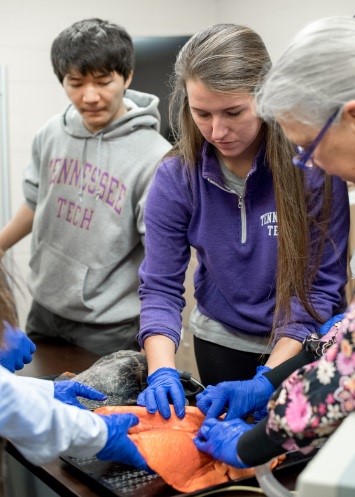Earning Honors Credit
Although there are requirements for graduating in cursu honorum, you get to customize your path to be as fun and enriching as you want! With Honors, you can build up your professional experience while gaining unique memories along the way.
> The Honors 22 Credit Hour Requirement
> The 15 Credit Hour Block Explained
> The 6 Credit Hour Block Explained
Important Deadlines to Keep in Mind!
- November 21: Any current Honors student that selected a proposal-based option for earning Spring 2026 Honors credit must submit their completed, signed proposal for review before they can receive a permit. Proposals are linked below with their corresponding information.
The Basics
Honors students must earn Honors credit each semester until their 22-hour requirement is complete in order to remain eligible for Honors benefits. Completing all 22 hours of Honors credit comes with perks, such as the Honors Minor and the in cursu honorum designation on your degree!
The Honors 22 Credit Hour Requirement
The first required course is HON 1010 — Introduction to Honors (1 cr).
It must be completed during your first fall semester after entering the Honors Program. HON 1010 can sometimes substitute for an introductory course required in your major, so be sure to check with your advisor.
Honors freshmen who want to be part of the future of healthcare should consider the Healthcare Track section of HON 1010, regardless of major! Contact us if you're interested.
After finishing Honors 1010, you must complete 15 Honors credits in at least three different disciplines. Maybe you want Honors credit in Biology, Professional Communication, and Music—with so many options and such flexibility, you can create your ideal Honors journey!
There are three options for earning your 15 credits hours:
- Honors Course Offerings - a selection of classes taught by Honors faculty for Honors students; receive a permit after completing the planning survey
- Honors Contracts - a way to customize a class you need for your major into an Honors class; receive a permit after completing the planning survey and the proposal
- Experiential Learning - getting Honors credit for hands-on projects and unique experiences; receive a permit after completing the planning survey and the proposal
Once you've finished most or all of your 15 credits, you must start working on the 6 upper-division Honors credits. Priority is given to Honors students who have completed most of their 22-hour requirement, are graduating soon, and are set to receive in cursu honorum at graduation.
As part of your 6 upper-division Honors credits, you must take one Honors Colloquium (3 cr) and one of the following options:
- An additional Honors Colloquium - a unique and engaging class taught by an Honors faculty member; receive a permit after completing the planning survey
- Honors Upper Division in the Major (HUDM) - a culminating honors-level experience throughout your major's final project, by doing advanced faculty-mentored research, or in taking a graduate course in your major; receive a permit after completing the planning survey and the proposal
- Honors Directed Study - an independent study under the supervision of a professionally qualified faculty member; receive a permit after completing the planning survey and the proposal
- Honors Interdisciplinary Thesis Option - a two-semester sequence that may be linked to major coursework by special arrangement; receive a permit after arranging everything with Mrs. Roberts and completing the planning survey
- Chemical Engineering Distinction in the Major - for ChemE majors only by arrangement with a supervising research mentor; receive a permit after arranging everything with Mrs. Roberts and your department and completing the planning survey
The 15 Credit Hour Block Explained
> Honors Experiential Learning
Honors Course Offerings
Honors courses are only for Honors students and usually contain fewer than 20 people. The small group size with like-minded individuals allows Honors students to build a stronger connection with their faculty instructor and one another!
Most of the courses meet the General Education requirements, but sometimes, a fun, distinct option is offered. The offerings are subject to change each semester, so make sure to view the Spring 2026 Honors Course List for what's coming next semester!
Honors Contracts
If none of the Honors Course Offerings are what you want, you can create an Honors Contract for a course in your major! This proposal-based option lets you create a special project with your regular course's professor to turn it into an Honors course just for you. Since binding agreements are common in the professional and personal settings (e.g. mortgage agreements, job contracts, grants, etc.), the Honors Contract option will give you crucial experience to apply throughout your adult life.
In order to contract a course, you must submit an Honors Contract Proposal by following these steps:
- » Sign up for the regular section of the course you want to Contract
Before you can receive a permit for an Honors Contract, you must first be enrolled in the course you're contracting and submit a proposal. You will drop this course later and enroll in the custom Honors section once it's created, but for now you must enroll in the non-Honors section you want so that your seat is reserved in the course. Some courses fill up fast, so don't delay!
- » Download the Honors Contract Proposal
View the Honors Contract Proposal and start brainstorming about what the special project will be. It needs to be something related to the course you're contracting and something the professor would find beneficial and engaging.
If you need help planning your Contract, contact Honors Assistant Director Mrs. White at lmwhite@tntech.edu.
- » Schedule a meeting with your course's professor
Construct a professional email for your professor to request a meeting. The tone should be formal, and the writing needs to be clear. Attach the blank proposal to the email so the professor can prepare for the meeting.
You can meet virtually with screen sharing or in-person—whatever works best for you both. If you have a preference, suggest it; if not, ask the professor what they prefer.
- » Meet with your professor
Dress respectfully and remember to bring your proposal form along to the meeting. Be prepared to pitch your idea for the special project, receive feedback from the professor, and hear their ideas.
During this meeting, you should fill out the proposal form together and acquire your professor's signature. (If you're meeting virtually, send a follow-up email thanking them for the meeting and attach the filled-out proposal for them to sign.)
- » Turn in your proposal by the deadline
You must turn in your Honors Contract Proposal the semester before you intend to take the contracted course by the deadline listed at the top of this page. Bring the completed, signed copy to the Honors Office (T.J. Farr 204B) or email it to Honors Director Mrs. Roberts at lrroberts@tntech.edu for approval.
- » What happens next?
If it's approved, Ms. Rachel will email you a permit for your contract. Once you receive the permit, you must drop the current course before adding the Honors section.
It will now reflect as an Honors course on your transcripts and count as Honors credit!
Honors Experiential Learning
If you plan to participate in an intensive study abroad program, faculty-mentored research, community-engaged service leadership, or competitive major-specific internship or field work, you can use the Honors Experiential Learning option to earn credit for your work!
In order to receive Honors credit for Experiential Learning, you must submit an Honors Experiential Learning Proposal by following these steps:
- » If your Experiential Learning option will replace a class you need to take, sign up
for the regular section of that course
If your Experiential Learning option will not replace a regular course, proceed to the next step but note that you will not receive a permit until after you've turned in your proposal.
Before you can receive a permit for Experiential Learning, you must first be enrolled in the course you're replacing (if applicable) and submit a proposal. You will drop this course later and enroll in the custom Honors section once it's created, but for now you must enroll in the non-Honors section you want so that your seat is reserved in the course. Some courses fill up fast, so don't delay!
- » Download the Experiential Learning Proposal
View the Honors Experiential Learning Proposal and consider which option for you will choose. Think about who you will need to contact, what you'll need to do to prepare, and start planning how you will achieve the steps laid out on the proposal for the option you prefer.
If you need help planning your proposal, contact Honors Director Mrs. Roberts at lrroberts@tntech.edu.
- » Fill out the proposal form and complete all the additional components
The Experiential Learning option requires planning and entails several steps, so be sure to refer to each section of the proposal form to keep up with what to do and when.
Fill out the proposal form, complete all the additional components, and acquire your faculty supervisor's signature.
- » Turn in your proposal and the additional components by the deadline
You must turn in your Experiential Learning Proposal the semester before you intend to start your commitment by the deadline listed at the top of this page. Bring the completed, signed copy along with all the additional components to the Honors Office (T.J. Farr 204B) or email it to Mrs. Roberts at lrroberts@tntech.edu for approval.
- » What happens next?
If it's approved, Ms. Rachel will email you a permit for your commitment.
Once you receive the permit, you must add the new, custom Honors course to your credit-hour load. If the Honors section is replacing a course you're currently enrolled in, please drop the current course before adding the Honors section.
It will now reflect as an Honors course on your transcripts and count at Honors credit!
The 6 Hour Credit Block Explained
> Honors Upper Division in the Major (HUDM)
> Honors Interdisciplinary Thesis
> Chemical Engineering Distinction in the Major
Honors Colloquium (3 cr)
An Honors Colloquium (pronounced kuh-low-kwee-um) is a unique upper-division seminar with an interdisciplinary focus not already offered at Tech. Each Colloquium is a 4000-level course taught by a professor with advanced academic credentials in the topic area that is approved by the Honors Council the semester prior.
To fulfill your 6-credit hour block, you are required to take at least one Honors Colloquium (3 cr)! For your other 3 credits, you can take an additional Honors Colloquium or one of the other options below. Sometimes exceptions are given under special circumstances. Contact Mrs. Roberts at lrroberts@tntech.edu to learn more.
The offerings are subject to change each semester, so make sure to view the Spring 2026 Honors Course List for what's coming next semester!
Honors Upper Division in the Major, or HUDM (3 cr)
The HUDM option allows you to create an individualized, culminating experience through advanced research, by taking a graduate-level course in your field, or in your major's final benchmark (e.g. capstone project, thesis, practicum, senior design, senior seminar, etc.)
In order to receive Honors credit for HUDM, you must submit an HUDM Proposal by following these steps:
- » If your HUDM option will replace a class you need to take, sign up for the regular
section of that course
If your HUDM option will not replace a regular course, proceed to the next step but note that you will not receive a permit until after you've turned in your proposal.
Before you can receive a permit for HUDM, you must first be enrolled in the course you're replacing (if applicable) and submit a proposal. You will drop this course later and enroll in the custom Honors section once it's created, but for now you must enroll in the non-Honors section you want so that your seat is reserved in the course. Some courses fill up fast, so don't delay!
- » Download the HUDM Proposal
View the HUDM Proposal and consider which option you will choose. Think about who you will need to contact, what you'll need to do to prepare, and start planning how you will achieve the steps laid out on the proposal for the option you prefer.
If you plan on taking a graduate-level course, talk to your advisor about how you can earn credit for your current undergraduate degree, future graduate degree, and Honors all at once!
If you need help planning your proposal, contact Honors Director Mrs. Roberts at lrroberts@tntech.edu.
- » Fill out the proposal form and complete the typed description
The HUDM option requires planning and several steps, so be sure to refer to each section of the proposal form to keep up with what to do and when.
Fill out the proposal form, type the proposal description, and acquire your instructor's and the department chair's signatures.
- » Turn in your proposal and the typed description by the deadline
You must turn in your HUDM Proposal the semester before you intend to start your commitment by the deadline listed at the top of this page. Bring the completed, signed copy and the typed description to the Honors Office (T.J. Farr 204B) or email it to Mrs. Roberts at lrroberts@tntech.edu for approval.
- » What happens next?
If it's approved, Ms. Rachel will email you a permit for your commitment. Once you receive the permit, you must add the new, custom Honors course to your credit-hour load.
If the Honors section is replacing a course you're currently enrolled in, please drop the current course before adding the Honors section. It will now reflect as an Honors course on your transcripts and count at Honors credit!
Honors Directed Study (3 cr)
The Honors Directed Study option is an independent study under the supervision of a professionally-qualified faculty member. This option allows you to investigate a topic you're interested in more deeply and create a physical report (paper, presentation, etc.) on your findings.
In order to receive Honors credit for the Honors Directed Study option, you must submit an Honors Directed Study Proposal by following these steps:
- » Download the Honors Directed Study Proposal
View the Honors Directed Study Proposal and start brainstorming. What will you study, what format will you use, which instructor will supervise you? There's a lot to consider, so start planning early!
If you need help planning your proposal, contact Honors Director Mrs. Roberts at lrroberts@tntech.edu.
Note: You will not receive a permit until after you've submitted your proposal.
- » Fill out the proposal form and complete the typed description
Regularly reference the proposal form when working with your instructor on building your Directed Study. You two should fill out the proposal form together so you're clear on their expectations and they understand your goals.
Type your proposal description according to the instructor's suggestions and let them proof it before you submit.
- » Turn in your proposal and the typed description by the deadline
You must turn in your Honors Directed Study Proposal the semester before you intend to start your commitment by the deadline listed at the top of this page. Bring the completed copy and the typed description to the Honors Office (T.J. Farr 204B) or email it to Mrs. Roberts at lrroberts@tntech.edu for approval.
- » What happens next?
If it's approved, Ms. Rachel will email you a permit for your commitment. Once you receive the permit, you must add the new, custom Honors course to your credit-hour load.
It will now reflect as an Honors course on your transcripts and count at Honors credit!
Honors Interdisciplinary Thesis (3 cr)
The Honors Interdisciplinary Thesis option allows you to write a thesis demonstrating your knowledge on a focused topic over two semesters. Since grad schools often require a thesis to graduate, this is an ideal option for those interested in a graduate degree.
This option requires prior planning one semester before you begin the two-semester commitment. For more information about the Interdisciplinary Thesis option, contact Mrs. Roberts at lrroberts@tntech.edu.
Chemical Engineering Distinction in the Major (3 cr)
Chemical Engineering majors have the additional option of arranging special research with a supervising mentor. You must plan ahead, so be sure to contact the Department of Chemical Engineering at least one semester in advance to learn more!
Preparing for Graduation
Honors Minor
Plan on completing the Honors 22 Credit Hour Requirement? Consider adding the optional Honors Minor! It comes with added benefits, such as:
- Recognition at a 3.1. You will earn the Honors minor with a GPA of at least 3.1 if you declare it. To receive the in cursu honorum Honors designation on the transcript, a GPA of 3.5 is required.
- Elevate your transcript. Why have a standard degree that doesn't highlight the work you're already doing? Adding the Honors Minor gives you additional official recognition for your Honors journey, which can be helpful when applying to grad schools or for employment.
If you want to add the Honors Minor, talk to your advisor prior to graduation.
Graduating In Cursu Honorum
So you're set to have an institutional GPA of 3.5 or higher and have all 22 Honors credit complete by graduation. You're now eligible to graduate in cursu honorum, which is the highest level of academic recognition! You must schedule your Honors Exit Interview with Mrs. Roberts at lrroberts@tntech.edu and your major faculty mentor before mid-semester of your graduation term in order to qualify.




